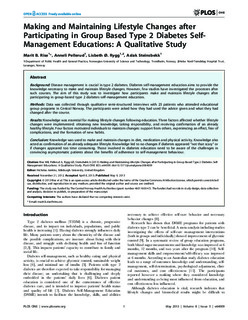Making and Maintaining Lifestyle Changes after Participating in Group Based Type 2 Diabetes Self-Management Educations: A Qualitative Study
Journal article, Peer reviewed
Permanent lenke
http://hdl.handle.net/11250/2360564Utgivelsesdato
2013Metadata
Vis full innførselSamlinger
Sammendrag
Background:
Disease management is crucial in type 2 diabetes. Diabetes self-management education aims to provide the knowledge necessary to make and maintain lifestyle changes. However, few studies have investigated the processes after such courses. The aim of this study was to investigate how participants make and maintain lifestyle changes after participating in group-based type 2 diabetes self-management education.
Methods:
Data was collected through qualitative semi-structured interviews with 23 patients who attended educational group programs in Central Norway. The participants were asked how they had used the advice given and what they had changed after the course.
Results:
Knowledge was essential for making lifestyle changes following education. Three factors affected whether lifestyle changes were implemented: obtaining new knowledge, taking responsibility, and receiving confirmation of an already healthy lifestyle. Four factors motivated individuals to maintain changes: support from others, experiencing an effect, fear of complications, and the formation of new habits.
Conclusion:
Knowledge was used to make and maintain changes in diet, medication and physical activity. Knowledge also acted as confirmation of an already adequate lifestyle. Knowledge led to no changes if diabetes appeared “not that scary” or if changes appeared too time consuming. Those involved in diabetes education need to be aware of the challenges in convincing asymptomatic patients about the benefits of adherence to self-management behaviour.
